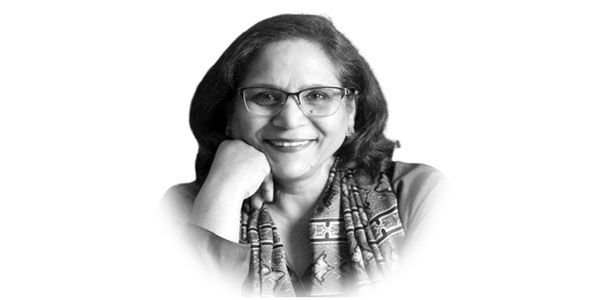Pakistani women striding confidently in 21st Century
STATUS, role and rights of women in society is not a new issue nor a fully settled one. Religion, traditions, societal values, customs, culture and emotions all come into play while deliberating on the role and rights of women.
In the 21st century when women in other parts of the world are reaching for the stars and beyond, we are still debating whether they be given the basic human right guaranteed to them in the country’s constitution.
Commenting on the role and contribution of women in the development of a nation, founder of Pakistan, Mr. Muhammad Ali Jinnah, unambiguously reminded the people that “No nation can ever be worthy of its existence or can rise to the height of glory that cannot take its women along with the men.
No struggle can ever succeed without women participating side by side with men.’During the independence struggle and in the early years of Pakistan’s existence, we saw women playing an important and impressive role in all walks of life showing what women can achieve and how they can make a meaningful contribution to the development of a country.
The 1973 Constitution guarantees equal rights and equal treatment before law to all citizens irrespective of gender.
Alas in reality we have neither followed the unambiguous direction given by the Quaid nor to the constitutional guarantees enacted in the 1973 Constitution.
Sadly this has led to Pakistan being categorized as one of the countries seriously lagging behind in women rights.
Domestic violence, honour killings, forced child marriages, traditions of wani, denying education, non-provision of basic health- care, harassment and unequal pay still persist.
Chairman Mao had very aptly said that ‘women hold half the sky’.Nothing could be truer.Among other factors, education and full involvement of women in the work force of China is one of the most important factors that led to the phenomenal rise of China.
This kind of clarity of vision is required today at the leadership level to enable the women of Pakistan to make their full contribution to the country’s development.
As integral part of society, Pakistani women have the potential to play a multi-dimensional role of societal and organizational responsibility, particularly when phenomenal changes are taking place across the globe.
If women are given equal opportunities in all fields, there is no doubt that they can produce spectacular results.
Despite all the restrictions, taboos, traditions and limitations, we have seen that Pakistani women have established their mark and performed tremendously well in all walks of life when given an opportunity.
It is the right time to actively integrate women in country’s job market and developmental policies, so that the pace of development in Pakistan can be enhanced.
Their services would be even more valuable if they were provided with more opportunities to acquire skills and move forward.
Today we see a small fraction of women, mostly in urban centres, striding confidently in the 21st century breaking one glass ceiling after the other when given an opportunity to grow wings and fly.
Whether it is politics, diplomacy, education, military service, health-care, nuclear science, arts and culture, space technology, agriculture, sports, natural disaster, pandemics, revolution or leadership, the Pakistani women have excelled in all field, inspiring future generations of women.
But these are too few to really make any significant change in the mindset of society at large.
A broader change in gender mindsets is imperative to ensure women’s rights.Pakistan is the world’s fifth most populous country and the second largest South Asian country with nearly half the population comprising women.
Pakistan has adopted a number of key international commitments to gender equality and women’s human rights.
The Universal Declaration of Human Rights, Beijing Platform for Action, the Convention on the Elimination of all forms of Discrimination against Women and the Sustainable Development Goals.
Pakistan has made commitments to honour its obligations under these international conventions.
Considerable work has been done in recent years to ensure compliance and enact local legislation.
Unfortunately, despite these commitments and efforts, Pakistan’s ranking for gender equality remains one of the lowest in the world.
Women globally are moving into a growing space and making inroads in the Fourth Industrial Revolution to drive global and regional knowledge economies of scale.
The idea of women as drivers of a nation’s economy or ‘Womenomics’ – a term coined by Kathy Matsui, and launched in Japan in 2013 to stimulate Japan’s economic growth and promote gender equality in the workforce is gaining currency.
Pakistan also needs to recognize the economic potential of women for the socio-economic development of the country.
For Womenomics to become a reality, both traditional and emerging occupational barriers need to be recognized and structurally and systemically addressed.
The exclusion of women in Pakistan’s social, political and economic institutions is a structural cause of inequity.
The literacy rate in women is 22 percent lower than men.Women are 49 percent of Pakistanis, but form only about 22 percent of the country’s labour force and receive only 18 percent of its labour income.
Women hold only 5 percent of senior leadership positions in the economy.Women vote much less often in both rural and urban areas, and women form only 20 percent of Parliament.
Women are less than 2 percent of the police force and are severely under-represented in the country’s superior courts.
Women’s empowerment has remained a contested issue in the complex socio-demographic and cultural milieu of our society.
Women are ranked lower than men on all vital human development indicators.
Therefore, studying various determinants of women’s empowerment and making effective laws and policies to rectify it is urgently needed.
Achieving gender equality is critical for the country’s long-term evolution as a resilient democracy that can meet its people’s needs, adequately confront violent extremism, resolve its conflicts non-violently and help stabilize a region that poses constant international security threats.
—The writer is former Ambassador, based in Islamabad.









